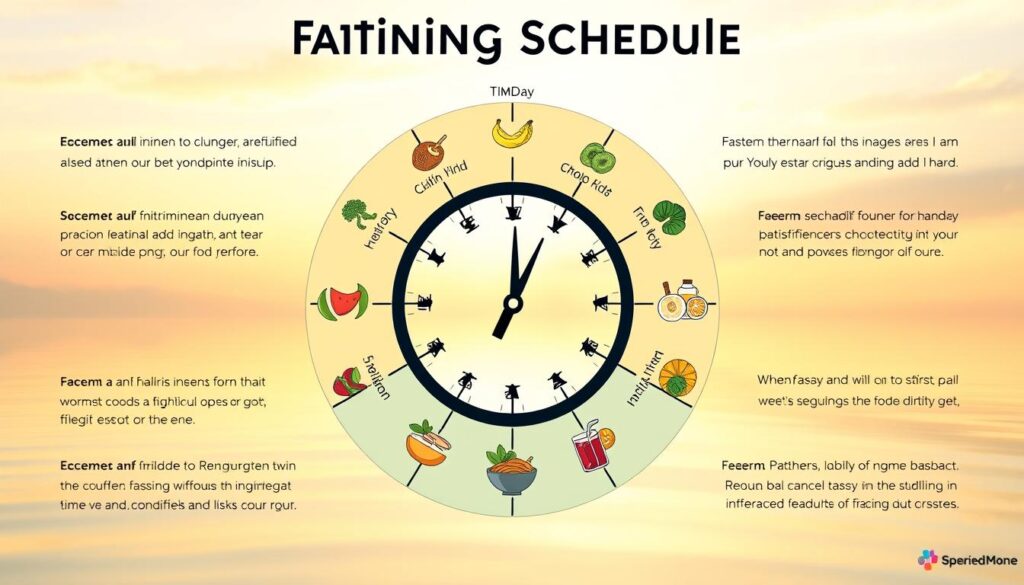Did you know over 75% of adults in the United Kingdom try intermittent fasting? This new way of eating is changing health and wellness. It offers benefits like weight loss, better metabolic health, and longer life. In this guide, you’ll learn how intermittent fasting works and how to use it for your health goals.
Key Takeaways
- Intermittent fasting is a dietary approach that involves cycling between periods of eating and fasting.
- Time-restricted eating, one of the most popular intermittent fasting methods, can help optimize your circadian rhythms and metabolism.
- Intermittent fasting has been linked to a range of health benefits, including weight management, improved metabolic health, and increased longevity.
- Choosing the right fasting schedule and preparing your body for the fast are crucial for a successful intermittent fasting journey.
- The science behind intermittent fasting reveals its impact on calorie restriction, autophagy, and overall metabolic function.
What is Intermittent Fasting?
Intermittent fasting is a way of eating that alternates between eating and fasting. You eat during certain times and don’t eat during others. It’s become popular for its health benefits.
Understanding Time-Restricted Eating
Time-restricted eating is a form of intermittent fasting. It limits your eating to a 6-8 hour window. The rest of the day, you don’t eat. This can help your metabolism and hormone levels, improving metabolic health.
Benefits of Intermittent Fasting
Intermittent fasting can help you lose weight and improve metabolic health. It also boosts autophagy, the body’s cell recycling process. Plus, it may help you live longer. It triggers fat burning and cell repair, leading to better health.
Intermittent fasting fits many lifestyles. By learning about time-restricted eating and its benefits, you can try it. See how it affects your metabolic health and longevity.
Intermittent Fasting Methods
Are you thinking about trying intermittent fasting? There are many methods to choose from. Each one has its own benefits and things to consider. This way, you can pick the best one for you.
The 16/8 method is very popular. You fast for 16 hours and eat in an 8-hour window, usually from noon to 8 PM. It helps control calories and boosts metabolic health.
The 5:2 diet is another favorite. You eat normally for 5 days and limit calories to 500-600 on the other 2 days. It’s a flexible way to enjoy fasting benefits.
If you’re up for a challenge, try alternate-day fasting. You alternate between eating normally and fasting or eating very little. It’s tough but can improve your health a lot.
Before starting any fasting method, talk to your doctor. They can help make sure it’s right for you. By exploring these options, you can find the best fit and start improving your health.
How to Start Intermittent Fasting
If you’re thinking about intermittent fasting, start by picking a fasting schedule that fits your life and goals. You might like the 16:8, 24-hour, or 5:2 method. It’s key to choose a plan you can stick to.
Choosing the Right Fasting Schedule
When picking a fasting schedule, think about a few things:
- Your daily routine and sleep habits
- What you’re comfortable with when it comes to fasting
- Your goals for weight management and metabolic health
Try out different schedules to find the one that suits you and your daily life.
Preparing for Your Fast
Before you start intermittent fasting, get your body and mind ready. Here are some tips:
- Drink lots of water, herbal tea, or other non-caloric drinks during your fast.
- Eat a balanced, nutrient-rich diet during your eating times to meet your nutritional needs.
- Slowly get used to your new fasting schedule by gradually increasing your fasting time.
Following these steps can help you transition smoothly and get the most out of intermittent fasting for your health and weight management.

The Science Behind Intermittent Fasting
Intermittent fasting is a topic that has caught a lot of attention lately. It’s all about calorie restriction, which greatly affects our health and how long we live.
Calorie Restriction and Metabolic Health
Intermittent fasting means eating fewer calories. This has many benefits, like less inflammation and better insulin use. It helps your body work at its best.
Autophagy and Longevity
Another cool thing about intermittent fasting is autophagy. It’s when your body gets rid of old cells. This process is linked to living longer, as it keeps your body clean and healthy.
As we learn more about intermittent fasting, we see its huge potential for health. It’s all about how calorie restriction, health, and autophagy work together. This knowledge helps us use it to improve our lives.

Conclusion
Intermittent fasting is a flexible and effective way to eat. It can improve your health and well-being. By learning about different fasting methods, you can better manage your weight, improve your metabolism, and live longer.
If you want to lose weight, get healthier, or try a new eating style, consider intermittent fasting. It can help you control your body, improve your metabolism, and even live longer.
Starting your intermittent fasting journey? Listen to your body and try different methods. Find what suits you best. With dedication and patience, you can use intermittent fasting to manage your weight and reach your health goals.
FAQ
What is intermittent fasting?
Intermittent fasting is a way of eating. It alternates between eating and fasting. You eat during certain times and fast during others.
What are the benefits of intermittent fasting?
It helps with weight loss and improves your metabolic health. It also boosts autophagy, which is the body’s way of recycling old cells. Plus, it might help you live longer.
What are the different methods of intermittent fasting?
There are many ways to do intermittent fasting. The 16/8 method, the 5:2 diet, and alternate-day fasting are a few. Each has its own benefits and ways of working.
How do I start intermittent fasting?
First, pick a fasting schedule that works for you. Think about your daily routine, sleep, and what you like. Stay hydrated and eat well during your eating times. Start slow to get used to it.
How does intermittent fasting affect metabolic health and longevity?
It can make your metabolism better by reducing inflammation and improving insulin sensitivity. It also helps your cells work better. Plus, it might help you live longer by increasing autophagy.

